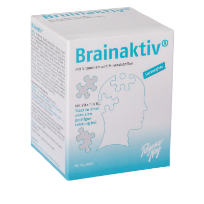
Areas of application / Brain
Brain
Our brain, this amazing and highly complex organ, is the seat of our thoughts, feelings and actions.
As part of the central nervous system, it is responsible for coordinating all physical and mental processes.
The brain consists of billions of neurons that communicate with each other through synaptic connections.
These networks form the basis for memory, learning, movement and perception.
Our brain allows us to feel, remember, plan and decide, and it enables us to understand the world around us.

The different regions of the brain have specialized functions: The frontal lobe controls our cognitive abilities, the temporal lobe is responsible for processing sensory impressions and memories, the parietal lobe plays a role in spatial perception, and the occipital lobe is in charge of visual processing.
Just as the harmonious interaction of neurons forms the basis for our thoughts and actions, targeted care of neuronal structures could help to support cognitive health in a natural way.
Diseases and symptoms
-
Dementia: A gradual decline in cognitive abilities, often accompanied by memory loss and impaired thinking.
There are two different forms of dementia: the degenerative form with Alzheimer’s disease, frontotemporal dementia and Lewy body dementia, and the vascular form caused by circulatory disorders in the brain. -
Parkinson’s syndrome: A degenerative neurological disease of the brain in which certain dopamine-producing cells are damaged.
The lack of dopamine, caused by the death of the substantia nigra, is therefore essentially responsible for the loss of muscle control and subsequently for all other symptoms of Parkinson’s disease.
Typical symptoms are: symptomatic lack of movement, muscle stiffness and tremors at rest. -
Multiple sclerosis: An autoimmune disease that damages the protective layer around the nerve fibers (myelin sheaths) in the brain and spinal cord, leading to a variety of neurological symptoms.
-
Headaches and migraines: painful sensations in the head caused by various factors, which can be particularly severe in the form of a migraine.
-
Stroke: A sudden interruption of the blood supply to the brain, which can lead to neurological deficits either as a result of a vascular occlusion (cerebral infarction) or a cerebral hemorrhage.
-
Brain trauma such as craniocerebral trauma caused by an injury to the skull and/or brain.
Mild symptoms such as headaches can occur, but also loss of consciousness, bleeding, movement disorders, pupillary dysfunction, cerebrospinal fluid leakage, seizures and unconsciousness/coma. -
Brain tumors: Abnormal growths of cells in the brain that can lead to various neurological symptoms depending on the type and location of the tumor.
-
Brain fog: Brain fog refers to the occurrence of neurocognitive symptoms such as concentration problems, orientation difficulties, difficulty finding words, sudden forgetfulness, mental exhaustion or the feeling of not being able to think clearly
Care and maintenance of health
-
Mental stimulation: Activities such as solving puzzles and reading, as well as singing and dancing, promote mental fitness and orientation and can therefore reduce the risk of dementia.
-
Healthy diet: A balanced diet rich in fruit, vegetables, nuts, whole grains, healthy fats and antioxidants promotes brain health.
-
Physical activity: Regular exercise supports blood flow to the brain and helps to prevent illness.
-
Stress management: Reducing chronic stress through relaxation techniques such as meditation and breathing exercises can support brain health.
-
Sleep hygiene: Sufficient and high-quality sleep supports the regeneration of the brain and helps prevent neurological diseases.
The following content is only visible to specialists. Register now.




